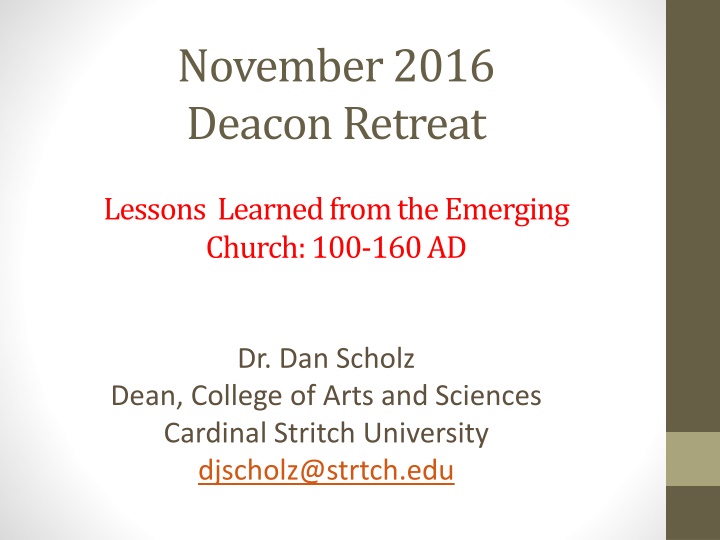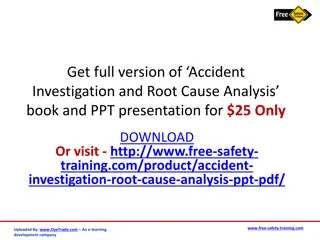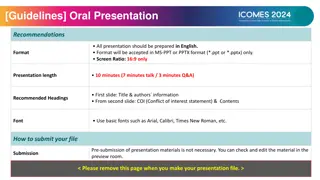
Lessons from Early Christian Church Leaders (100-160 AD)
Explore the teachings and writings of early Christian church leaders from 100-160 AD, including the Apostolic Fathers and the Later New Testament Writings. Discover key characteristics and sources that shaped the emerging church during this time.
Download Presentation

Please find below an Image/Link to download the presentation.
The content on the website is provided AS IS for your information and personal use only. It may not be sold, licensed, or shared on other websites without obtaining consent from the author. If you encounter any issues during the download, it is possible that the publisher has removed the file from their server.
You are allowed to download the files provided on this website for personal or commercial use, subject to the condition that they are used lawfully. All files are the property of their respective owners.
The content on the website is provided AS IS for your information and personal use only. It may not be sold, licensed, or shared on other websites without obtaining consent from the author.
E N D
Presentation Transcript
November 2016 Deacon Retreat Lessons Learned from the Emerging Church: 100-160 AD Dr. Dan Scholz Dean, College of Arts and Sciences Cardinal Stritch University djscholz@strtch.edu
The Four Sessions Fri night How the early Christians related to Outsiders First Peter 7:30 pm Sat morning Early Christian Civil Wars Second Peter, Jude, 1, 2, and 3 John 9:00 am Sat afternoon Early Christian Apocalypses Revelation of John 3:30 pm Sun morning Early Christian Dynamic Homilies Hebrews 9:00 am
The Emerging Church : Background and Sources
Sources: The Later NT Writings Order in NT Letter to the Hebrews Letter of James First Letter of Peter Second Letter of Peter First Letter of John Second Letter of John Third John of John Letter of Jude Revelation of John Date of Composition 95-100 AD 100 AD 90-110 AD 140 AD 90-95 AD 90-95 AD 90-95 AD 100-140 AD 90-110 AD
Sources: The Writings of the Apostolic Fathers AF Text Date of Composition 100-110 AD 110-117 AD 155-156 AD around 120 AD 150-200 AD 100 AD around 150 AD around 120 AD around 130 AD 110-140 AD The Didache The 7 Letters of Ignatius The Martyrdom of Polycarp The Apology of Quadratus The Epistle to Diognetus First Letter of Cement Second Letter of Clement Polycarp s Philippians The Epistle of Barnabas The Shepherd of Hermas
From the Age of the Apostles to the Age of the Apostolic Fathers The apostolic age covers seventy years, from the resurrection of Christ (around 30 CE) to the death of the last apostle, John (around 100 CE). The next generation of Christian leaders, 100-160 CE, are called the apostolic fathers. The apostolic fathers were Church bishops (e.g., Ignatius of Antioch and Polycarp of Smyrna) and unknown authors of significant writings from this time period (e.g., the Didache, the Shepherd of Hermas, the Epistle of Barnabas, First and Second Clement). The authors of the later NT writings and the authors of the writings of the Apostolic Fathers are second and third generation believers.
Defining characteristics of Christians (100-160 AD) The experience of being a Christian is localized Where you meet (voluntary [illegal] association) What writings guide your gatherings (no NT canon yet) Which level of persecution: tolerance-harassment- prison/death Emerging practices Initiation rites: catechesis and adult baptism Common practices at gatherings (ekklesia / church ): readings, reflections, celebrating the Lord s Supper Male hierarchy taking shape: bishops, presbyters, deacons Diversity (divergence) of voices present in the congregations
Roman Empire and the continental U.S. http://wps.ablongman.com/wps/media/objects/262/268312/art/figures/KISH106.jpg
Session 1: How the Early Christians Related to Outsiders New Testament Sources: Apostolic Fathers Sources: The 7 Letters of Ignatius The Martyrdom of Polycarp The Apology of Quadratus The Epistle to Diognetus The First Letter of Peter
How the Early Christians Related to Outsiders Questions for Theological Reflection 1. Who do you consider outsiders associated with your faith community? 2. What strategies do you employ in dealing with current outsiders to the faith? 3. How can the Church effectively evangelize outsiders?
How the Early Christians Related to Outsiders Historical Context of the Sources
The First Letter of Peter Written between 80-100 CE to the Gentile Christian communities living in the five Roman provinces of Pontus, Galatia, Cappadocia, Asia, and Bithynia. The author is unknown, but writes in the name and authority of Peter. Possibly composed in the city of Rome.
The 7 Letters of Bishop Ignatius All 7 letters were written by Ignatius, Bishop of Syria, on his way to martyrdom. The letters were composed sometime between 110-117 CE. Five of the 7 letters were targeted for five different church in Asia Minor, one for the church in Rome, and one for a fellow bishop, Polycarp. Four of the church letters were written from Smyrna, and the other three were written from Troas (both in Asia Minor).
The Martyrdom of Polycarp Polycarp, Bishop of Smyrna, was martyred in 154-55 CE. He was 86 years old. The Martyrdom of Polycarp is actually a letter sent from the members of the church of Smyrna in Asia to the church members in the city of Philomelium in Phrygia, about 100 miles east of Smyrna. The letter was composed in 156 CE.
The Apology of Quadratus Quadratus, Bishop of Athens, wrote an apology (a defense of the faith) to Hadrian, who was the Roman emperor from 117-138 CE. The full text of the apology is missing. All that remains is a single fragment. The Apology of Quadratus is thought to have been composed around 120 CE.
The Epistle of Diognetus The author of the Epistle to Diognetus is unknown. The intended recipient of this letter, most excellent Diognetus is otherwise unknown. The date of composition is uncertain, although most scholars date it to the second half of 2nd century, 150-200 CE. Place of composition is possibly Asia Minor.
Circumstances of these Writings These early- to mid-second century CE authors were reacting to outsiders under various circumstances: 1 Peter, the letters of Ignatius, and the Martyrdom of Polycarp were written during a time of varying levels of duress and mostly deal with persecution. The Apology of Quadratus and the Epistle to Diognetus present arguments for the legitimacy of Christian beliefs. o The Apology of Quadratus is a fragment of an apology reacting to the Roman state. o The Epistle to Diognetus is a letter written in response to ancient philosophy.
How the Early Christians Related to Outsiders Strategies Identified in these Sources
Quotes and Strategies dealing with Outsiders First Peter Offer advice on how to cope with suffering. Always be ready to give an explanation to anyone who asks you for a reason for your hope so that when you are maligned those who defame your good conduct in Christ may themselves be put to shame. For it is better to suffer for being good, if that be the will of God, than for doing evil. Bring relief to those insiders suffering Beloved, do not be surprised that a trial by fire is occurring among you. But rejoice to the extent that you share in the sufferings of Christ, so that when his glory is revealed, you may also rejoice exultantly But whoever is made to suffer as a Christian should not be ashamed but glorify God because of his name. 1 Pet 3:15-16 1 Pet 4:12-16
Dealing with Outsiders First Peter Defend the faith through self-discipline Beloved, I urge you as aliens and sojourners to keep away from worldly desires that wage war against the soul. Maintain good conduct among the Gentiles, so that if they speak of you as evildoers, they may observe your good works and glorify God on the day of visitation. 1 Pet 2:11-12
Dealing with Outsiders The 7 Letters of Ignatius Show no fear of torture and death I am God s wheat and I am being ground by the teeth of wild beasts to make a pure loaf for Christ. Rom. 4:2 What a thrill I shall have from the wild beasts that are ready for me! I hope they make short work of me. Rom. 5:2 Pass on the authentic faith to those who hate us There is only one physician of flesh yet spiritual, born yet unbegotten, God incarnate, genuine life in the midst of death, sprung from Mary as well as God, first subject to suffering then beyond it Jesus Christ our Lord. Eph. 7:2
Dealing with Outsiders The Martyrdom of Polycarp Think of martyrdom in the context of Jesus passion The adventurous story of Polycarp s martyrdom bears remarkable similarities to the New Testament Gospel accounts of Jesus arrest and seizure. o Polycarp s entry into the city of Smyrna to face martyrdom mounted on an ass ready to face Herod, and his father, Nicetas (Mart. Pol. 8:2); and even a voice from heaven strengthening Polycarp as he faced death (Mart. Pol. 9:1).
Dealing with Outsiders The Martyrdom of Polycarp Accept martyrdom as God s will The Christians in Smyrna viewed all the martyrdoms and the death of Polycarp in particular, as God s will, since God has power over all things (Mart. Pol. 2:1).
Dealing with Outsiders The Apology of Quadratus Defend the faith by showing Jesus miracles were legitimate (lasting and real) But the works of our Saviour were always present, for they were true those who were healed, those who were raised from the dead, who were not only seen when healed and raised, but were always present and not just while the Saviour was here, but even when he had gone they remained for a long time, so that some of them survived even to our own time. entire fragment
Dealing with Outsiders The Epistle to Diognetus Defend the faith through education (catechesis) I understand, sir, that you are really interested in learning about the religion of the Christians, and that you are making an accurate and careful investigation of the subject. Highlight the stupidity of other religions Christians are not the slaves of [false] gods like these [pagans] Jews are superstitious offering gifts to God just as if he needed them. Diogn. 1:1 - Diogn. 2:10 - Diogn. 3:3
10 Strategies for Christians relating to Outsiders 1. Offer advice on how to cope with suffering. (1 Pet) 2. Bring relief to the insiders suffering. (1 Pet) 3. Defend the faith through self-discipline. (1 Pet) 4. Show no fear of torture and death. (Ignat.) 5. Pass on the authentic faith to those who hate us. (Ignat.) 6. Think of martyrdom in the context of Jesus passion. (Mart. Pol) 7. Accept martyrdom as God s will. (Mart. Pol) 8. Defend the faith by showing Jesus miracles were legitimate (lasting & real). (Apol Q) 9. Defend the faith through education (catechesis).(Diogn.) 10.Highlight the stupidity of other religions. (Diogn.)
How the Early Christians Related to Outsiders Questions for Theological Reflection 1. Who do you consider outsiders associated with your faith community? 2. What strategies do you employ in dealing with current outsiders to the faith? 3. How can the Church effectively evangelize outsiders?






















